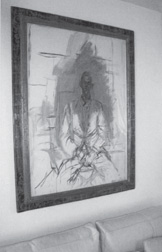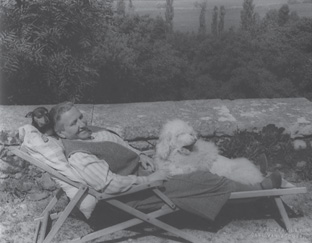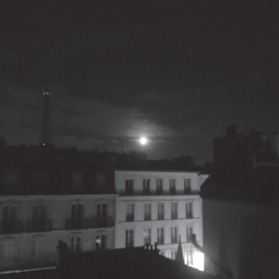
TODAY I ENCOUNTERED fifteen horses marching down the avenue in the cold, bright sunlight. The horses were many shades of brown, and the riders wore black coats with long gold swords dangling from their waists, which matched their boot spurs and the chin straps on their helmets. I could hear the horses’ hooves striking the pavement long before they were visible, and when they stopped at an intersection, all of us on the sidewalk, in cars, or on motorcycles couldn’t help but pause and admire them, smiling as the wind played with their brushed tails. High up, the handsome riders conversed among themselves, and when the traffic light changed, one rider at the front lifted his arm, and they all crossed the boulevard Saint-Michel toward the Luxembourg Gardens. Later, returning from the post office, I encountered the horses again, and their phalanx seemed to me like a poetry muscle exercising itself to remain strong, the precise movements of each horse and rider like the lines of a poem moving across a blank page, representing the highest degree of control—of selection and omission—as when language is assembled into art.

LAST NIGHT I ATE DINNER with James Lord, the biographer of Picasso and Giacometti, at a hotel across from James’s building on the rue des Beaux-Arts—formerly the Hôtel d’Alsace, one of a string of cheap hotels where Oscar Wilde spent his last days while suffering from “mussel poisoning,” as he called it, which caused red splotches on his arms, chest, and back, making it difficult for him not to scratch. Because of this itching, the ailment was not thought to have been syphilis, though it was certainly syphilitic in origin.
His doctors made sixty-eight visits to room 16 during Wilde’s final weeks as the symptoms became graver, making the following report: “There were significant cerebral disturbances stemming from an old suppuration of the right ear. . . . The diagnosis of encephalitic meningitis must be made without doubt.” Wilde died with no family present, and a priest applied sacred oils to his hands and feet, though he wasn’t Catholic. Richard Ellmann’s moving biography records the last moments:
A loud, strong death rattle began, like the turning of a crank. Foam and blood came from his mouth during the morning, and at ten minutes to two in the afternoon Wilde died. . . . He had scarcely breathed his last breath when the body exploded with fluids from ear, nose, mouth, and other orifices.

When I arrived at James’s elevator landing, he gave me the bisous—kisses with our cheeks touching—instead of the usual American handshake, and I presented him with pink lilies, which he promptly put in a silver urn that had belonged to his father. We sat in the living room, where James drank a Diet Coke and I sipped a scotch—he under the large Giacometti portrait, the most commanding artwork in the apartment, which had required eighteen sittings before Giacometti completed it.
I knew this from reading Plausible Portraits, James’s little book recording his visits to Giacometti’s studio. In it, James writes, “From the beginnings of civilization it has been the human likeness which has most preoccupied man. What we seek and value in a work of art is its relevance to human life, its emotional and intelligible relation to a representational vision of a living being.” I believe the same is true for poetry. I want to write poems that are X-rays of the soul in moments of being and seeing. This includes the ghastly, the insane, and the cruel, but also beauty, Eros, and wonder. In short, a poem is like a portrait. It is an artist’s most profound and expressive response to life.

At dinner, James wore his tweed jacket with his Légion d’honneur rosette.

Asking him about Ernest Hemingway’s memoir of his formative years as a writer in Paris, A Moveable Feast, I wasn’t surprised to hear James say that it was a despicable book by a fine writer.
Hemingway thought that Gertrude Stein considered him a “square at sex,” so one day he admitted his prejudices in connection with homosexuality. They were drinking eau-de-vie and suddenly having a dangerous conversation, as Stein asserts: “The main thing is that the act male homosexuals commit is ugly and repugnant and afterwards they are disgusted with themselves. They drink, take drugs, to palliate this, but they are disgusted with the act and they are always changing partners and cannot be really happy.” Hemingway responds, quietly, “I see.” But Stein presses on, saying that women are the opposite of men, doing nothing that is disgusting or repulsive, therefore leading happier lives together, unlike homosexual men.

James insisted that Stein didn’t feel this way, and said he didn’t believe the episode in which Hemingway overhears her quarreling with Alice B. Toklas, who is speaking to Stein as he has never heard one person speak to another—“never, anywhere, ever.” Hemingway describes Stein’s voice pleading and begging, “Don’t, pussy. Don’t. Don’t, please don’t. I’ll do anything, pussy, but please don’t do it. Please don’t. Please don’t, pussy.”
Could Hemingway have lied about so intimate a scene? Could a lie have truth as its basis? Could it be that such a frank story, even one not based on real facts, has been created for art’s sake? At the back of the restored edition of A Moveable Feast there are transcriptions from Hemingway’s handwritten fragments for the introduction: “This book is fiction.” “This book is all fiction and the fiction may throw some light on what has been written as fact.” “This book is fiction and many things have been changed in fact to try to make it a picture of a true time.”

Poetry is different from fiction. Poetry is not a lie that tells the truth. A poem must burn with a truth-seeking flame and be a small symphony of language, too. Often my poems contain real events and real details from life, but I don’t want them to be like diary entries. I want to create an imaginative world that seems to be entirely my own, one that is neither confessional nor abstract.
Walking home alone, I climbed Montagne Sainte-Geneviève under a full moon.
THIS AFTERNOON was cold and damp, and I met my translator Claire Malroux at La Closerie des Lilas, on the boulevard du Montparnasse, which Hemingway mentions in A Moveable Feast. It is a café that retains its old world atmosphere, with a zinc bar and red leather banquettes. I kept my coat on while waiting for Claire at the entrance and pondered the corpses of lobsters displayed on a platter of ice.

We ate in the less expensive brasserie, where the waiter said “bingo” each time he served me because it is an English word, and he recognized I wasn’t French. In the next room, an elderly man played a polished black grand piano.
Claire talked about her work. Unlike many American poets, she has never taught. She spent her early childhood in a small rural village where her parents were elementary-school teachers. Because of her father’s involvement in the French Resistance, he was incarcerated and died in the Nazi concentration camp Bergen-Belsen. In her book A Long-Gone Sun, she describes the moment when her young father was taken. The doorbell rings “long and loud” one morning and he goes to answer it. Two policemen wait while he packs his razor and toothbrush, and Claire notices his face reflected in the mirror above the sink. The episode is brief. Her last glimpse of him is as a silhouette in the back of a Citroën.

I cannot imagine having such a memory to haunt me for my whole life. This, in part, must be why Claire has devoted so many years to translating Emily Dickinson and Wallace Stevens, poets who remind us continually of the evanescence of flesh.
I AM READING her translation into French of Stevens’s last poems, comprising a volume titled The Rock, which received a full-page review in Le Monde. According to the poetry critic Helen Vendler, in these poems Stevens becomes the “silent rhapsodist” of the earth:
The two worlds are asleep, are sleeping, now.
A dumb sense possesses them in a kind of solemnity.
The self and the earth—your thoughts, your feelings,
Your beliefs and disbeliefs, your whole peculiar plot . . .
(from “An Old Man Asleep”)
Claire translates the third line of Stevens’s poem as “Le moi et la terre—tes pensées, tes sentiments,” and I’m surprised that moi = self. In French, there exists no separate word to describe the total, essential, or particular being of a person (the individual self ) other than the word for “me,” the objective case of “I.”
It is difficult to think of lyric poetry without any separate word for “self.” Can the strange confusion of lines that is despair really be conveyed without it? Perhaps it is the article before moi—le moi—that is enough to make it entirely different from “me,” so that moi is more subjective (me) and le moi more objective (the self ).
In any case, Stevens knew French closely, and would have been aware of these differences. Though he traveled only once outside the States—to Havana—he was an avid Francophile, giving titles to his poems like “Esthétique du Mal” and “Le Monocle de Mon Oncle.” Making the excuse that his wife was not a good traveler, he seldom ventured far from their quiet home in Hartford, Connecticut. To a friend visiting France, he wrote, “On my death there will be found carved on my heart, along with the initials of attractive girls that I have known, the name of Aix-en-Provence.”

La closerie des lilas means an enclosure of lilac bushes, and adorning our table was a little vase of ethereal freesia. I like people who are fond of flowers. Though it is difficult to divine their supernatural qualities into words, I try to do so again and again in my poems, as in “Bowl of Lilacs”:
My lilacs died today, floating in a bowl.
All week I watched them pushing away,
their pruned heads swollen together into something
like anger, making a brief comeback
toward the end, as if secretly embalmed.